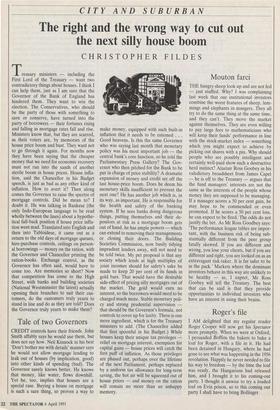Tale of two Governors
CREDIT controls have their friends. John Smith affably says he would use them, but does not say how. Neil Kinnock in his best `Don't bother me with details' manner says he would not allow mortgage lending to leak out of houses (by implication, good) into other kinds of spending (bad). The Governor surely knows better. He knows that money, like water, flows downhill. Yet he, too, implies that houses are a special case. Buying a house on mortgage is such a sure thing, so proven a way to
make money, equipped with such built-in inflation that it needs to be rationed . . . Good heavens. Is this the same Governor who was saying last month that monetary policy was his most important job — the central bank's core function, so he told the Parliamentary Press Gallery? The Gov- ernor who then pitched for the Bank to be put in charge of price stability? A dramatic expansion of money and credit set off the, last house-price boom. Does he deem his monetary skills insufficient to prevent the next one? He has another job which is, in its way, as important. He is responsible for the health and safety of the banking system. If he sees banks doing dangerous things, putting themselves and their de- positors at risk as a mortgage boom gets out of hand, he has ample powers — which can extend to removing their managements or closing their doors. The Building Societies Commission, now busily tidying imprudent lenders away, will not need to be told twice. My pet proposal is that any society which lends at high multiples of joint incomes should for safety's sake be made to keep 20 per cent of its funds in gold bars. That would have the desirable side-effect of pricing silly mortgages out of the market. The gold would earn no interest, so the borrowers would need to be charged much more. Stable monetary poli- cy and strong prudential supervision that should be the Governor's formula, not controls to cover up for laxity. There is one more ingredient, which is for the Treasury ministers to add. (The Chancellor added that first spoonful in his Budget.) While houses keep their unique tax privileges relief on mortgage interest, exemption for capital gains — house prices will catch the first puff of inflation. As those privileges are phased out, perhaps over the lifetime of the next Parliament, perhaps replaced by a uniform tax allowance for long-term saving, the hot air will be squeezed out of house prices — and money on the ration will remain no more than an unhappy memory.


















































 Previous page
Previous page